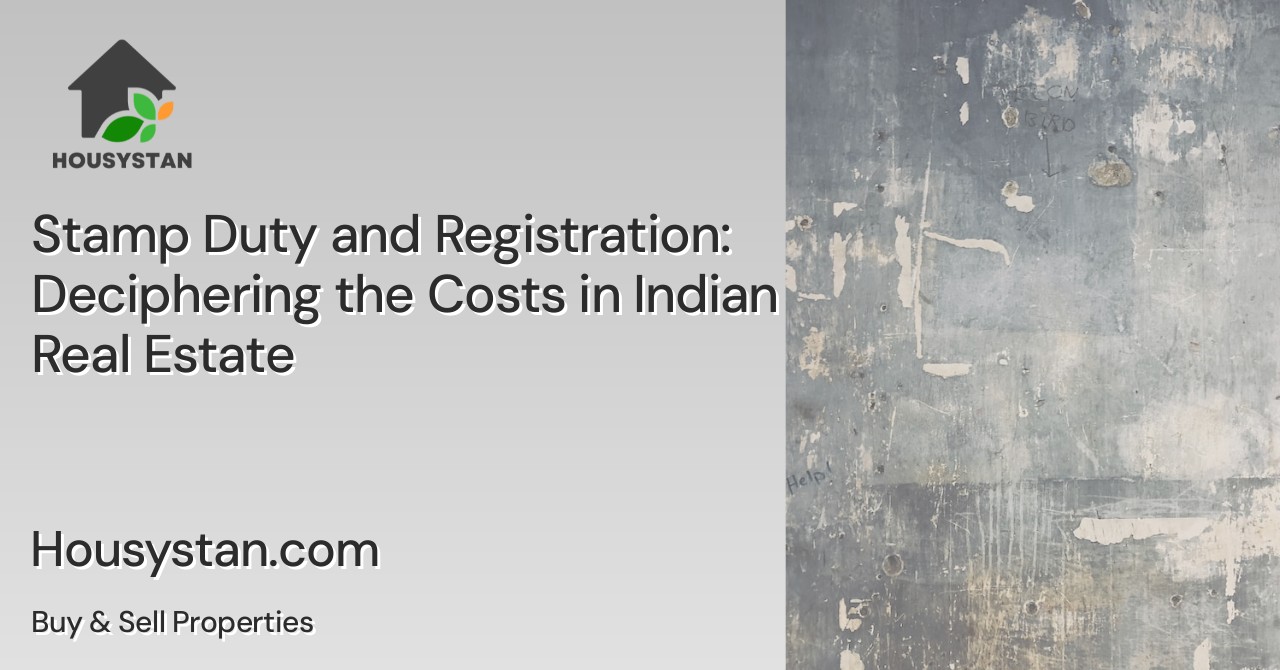Stamp Duty and Registration: Deciphering the Costs in Indian Real Estate
Read latest blogs and articles from Housystan

The Information mentioned here was last updated on:
21/2/2026Stamp Duty and Registration: Deciphering the Costs in Indian Real Estate
Introduction: Understanding the True Cost of Property Ownership
For many Indians, purchasing real estate marks a major milestone—often the culmination of years of planning, saving, and dreaming. Yet, amid the excitement of finding the perfect property, buyers can sometimes overlook the significant additional expenses that accompany the transaction. Among these, stamp duty and registration charges are two mandatory financial obligations that every property buyer must factor in. But what exactly are these charges, why are they imposed, and how much should buyers budget for them? This in-depth article breaks down the essentials of stamp duty and registration costs in the Indian real estate market, equipping you with the clarity needed to navigate your next property purchase.
- Verified Tenants/Buyers
- Unlimited Property Listing
- Zero subscription/charges fee
What Is Stamp Duty? The Backbone of Legal Property Ownership
Stamp duty is a government tax levied on legal documents, most notably property sale agreements. When transferring ownership of immovable property—be it land, an apartment, or a commercial space—the buyer must pay this charge to the respective state government. The payment of stamp duty legalizes the transaction and serves as proof of ownership in the eyes of the law. Essentially, a property transaction is not considered valid or enforceable in a court of law unless the requisite stamp duty has been paid. This underscores the importance of factoring stamp duty into your overall budget.
Registration Charges: Securing Your Place in Government Records
While stamp duty authenticates the transaction, registration charges ensure the buyer’s title is officially recorded with the government. Upon payment of these charges, the transaction details are entered into the public records maintained by the local Registrar of Assurances. This step is crucial—it not only acts as a safeguard against future disputes but also provides legal validity to the transfer of property ownership. Registration charges are typically calculated as a fixed percentage of the property’s sale value and must be paid at the time of registering the sale deed.
How Are Stamp Duty and Registration Charges Calculated?
Unlike income tax or GST, stamp duty and registration charges do not follow a uniform structure across India. Each state government determines its own rates, which may also vary within cities or municipalities. Several factors influence these rates:
As of 2024, stamp duty generally ranges from 3% to 7% of the property value, while registration charges hover between 0.5% and 2%. It’s critical to check the current rates in your locality before finalizing a deal.
Illustrative Example: Calculating the Total Cost
Suppose you are buying an apartment in Pune, Maharashtra, valued at ₹1 crore. The stamp duty rate stands at 5%, and the registration charge is 1%. Here’s how the math adds up:
This means you need to budget not just for the property price, but also for these statutory charges—often a hefty sum that can’t be financed by most home loans.
Why Are These Charges So Important?
Stamp duty and registration charges serve several crucial purposes:
Skipping or underpaying these charges can result in hefty penalties or even annulment of the transaction.
Recent Trends and Changes in Stamp Duty Policies
In recent years, several state governments have tweaked stamp duty and registration charges to stimulate the real estate sector. For instance, Maharashtra temporarily slashed stamp duty rates during the COVID-19 pandemic, leading to a noticeable uptick in property registrations. Some states now offer digital stamping and online registration, making the process more transparent and hassle-free. Additionally, there is a growing push for gender parity in property ownership, with many states offering reduced rates for female buyers—a small but impactful step towards empowering women.
How to Pay Stamp Duty and Register Property
The process has become far more streamlined thanks to digitization:
Tips to Save on Stamp Duty and Registration Charges
Conclusion: Budgeting Smartly for a Seamless Property Purchase
Stamp duty and registration charges are non-negotiable components of the property buying process in India. While these costs can be significant, understanding their calculation and purpose can help you approach your real estate investment with confidence and foresight. Always research the prevailing rates in your area, factor them into your financial planning, and ensure timely compliance to safeguard your property rights. In a sector as dynamic as Indian real estate, being informed is your best bet for a smooth and legally sound transaction.